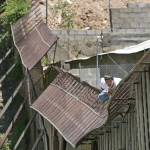The National Courts Monitor is helping organize a new workgroup to look into how the asbestos litigation system treats cancer victims and other families impacted by the substance. In particular, the group hopes to help discover if the practices of some special bankruptcy trust funds, and the attorneys who work with them, leaves families vulnerable to charges they have shortchanged insurance companies or other health-care providers like Medicaid.
NCM Publisher Sara Warner explains that the group is organizing as civil racketeering lawsuits are popping up around the country, based largely on the revelations from the “Garlock” case in North Carolina where a federal judge found “evidence suppression” as he looked into 15 different asbestos cases.
The issue is especially important for our nation’s veterans because more of them are at risk from asbestos disease.
As the Military.com website put into context:
“While veterans represent 8% of the nation’s population, they comprise an astonishing 30% of all known mesothelioma deaths that have occurred in this country… virtually every ship commissioned by the United States Navy between 1930 and about 1970 contained several tons of asbestos insulation in the engine room, along the miles of pipe aboard ship and in the walls and doors that required fireproofing…”
You can read more about Sara’s views here:
http://www.huffingtonpost.com/entry/new-asbestos-victims-group-exploring-litigation-scandals_us_58aee259e4b0ea6ee3d03622
And the group’s website: http://www.asbestosdoublevictims.org/
And more about the veterans’ issue here:
http://www.huffingtonpost.com/sara-warner/a-sad-truth-for-veterans_b_9417622.html







